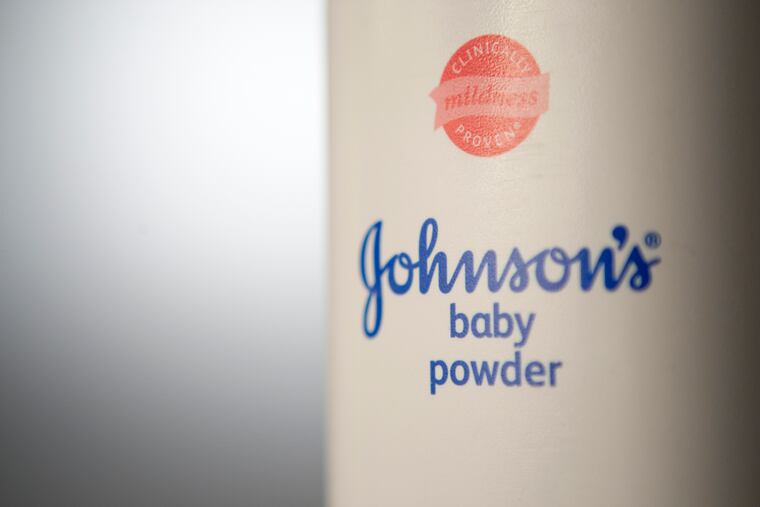Johnson & Johnson recalls baby powder after asbestos found in sample
Johnson & Johnson is recalling one lot of its Johnson’s Baby Powder after tiny amounts of asbestos contamination were found in samples from a single bottle purchased online.

Johnson & Johnson is recalling one lot of its Johnson’s Baby Powder after tiny amounts of asbestos contamination were found in samples from a single bottle purchased online.
J&J is voluntarily recalling the lot, #22318RB, and encouraging people who bought the product to discontinue use. The company said that it is working with the Food and Drug Administration, which tested the bottle, and has started an investigation into how and when the product was contaminated.
J&J shares fell more than 6% Friday. The stock has been under pressure as investors try to ascertain the company’s potential liabilities in a series of lawsuits related to talc and other products.
“Thousands of tests over the past 40 years repeatedly confirm that our consumer talc products do not contain asbestos,” J&J said in a statement on Friday.
Company spokesperson Ernie Knewitz declined to comment beyond the news release and said he wouldn’t speculate on what the development means for the litigation.
J&J is looking into whether cross-contamination of the sample caused a false positive, whether the product was appropriately sealed and maintained in a controlled environment, and whether the product was a counterfeit.
Chief Financial Officer Joseph Wolk said on a Tuesday conference call with investors that the company wouldn’t set aside any legal reserves for the more than 100,000 lawsuits it faces across its portfolio of drugs, consumer products, and medical devices, saying it expects to fight and win many of the claims.
“The management team here will look at what a reasonable outcome could be for all stakeholders involved,” Wolk said. “When products are safe, when they’re effective, we’re going to look to make sure that those products aren’t subject to what’s become unfortunately a big business model for plaintiff’s attorneys.”
J&J has already settled some of the lawsuits in which plaintiffs contend they were given cancer by the talc-based personal care products, but 15,500 suits remain, according to a July filing with the U.S. Securities and Exchange Commission.
Baby powder-related liabilities could eventually cost the company as much as $5 billion, according to Bloomberg Intelligence. Though the product accounts for only a small fraction of J&J’s annual revenue, it’s been a core brand for the company for more than a century.
Longstanding claims
Lawyers for women who blame their cancers on asbestos-tainted talc powder contend internal J&J documents indicated officials knew since the 1970s that powder mined in places such as Vermont and Italy contained trace amounts of asbestos, but failed to alert consumers or regulators. Asbestos is often found intertwined with talc.
”Had J&J acted responsibly and removed Johnson’s Baby Powder from the market in the 1970s, they would have saved the lives of thousands of women who have died needlessly of ovarian cancer,” Leigh O’Dell, an Alabama lawyer who is leading the plaintiffs’ cases that have been consolidated before a federal judge in New Jersey for pretrial information exchanges, said on Friday.
Mark Lanier, who persuaded a St. Louis jury last year to hit J&J with a $4.7 billion verdict on behalf of more than 20 women who said they developed ovarian cancer through long-term use of the company’s talc-based products, said he doesn’t expect this to be the last time that its talc will be found to contain asbestos.
“This confirms thousands of tests” over the years that have uncovered asbestos in J&J’s Baby Powder, he said.
Chris Placitella, a New Jersey lawyer who recently won a $37.2 million verdict in a talc case brought against J&J in its home city of New Brunswick, said the company’s own documents show they’ve known there was asbestos in its baby powder for at least four decades.
“This finding confirms exactly what multiple juries have found based upon internal testing done by Johnson & Johnson and what Johnson & Johnson has been denying for more than 40 years,” he said.
J&J said in February that it had received subpoenas and inquiries related to its iconic baby-powder products from the U.S. Justice Department, the SEC, and the top Democrat on the Senate Committee on Health, Education, Labor and Pensions. Knewitz, the J&J spokesperson, said at the time that the company would cooperate with the inquiries.
Bloomberg News reported in July that the Justice Department is pursuing a criminal investigation into whether J&J lied to the public about the possible cancer risks of its talc powder.